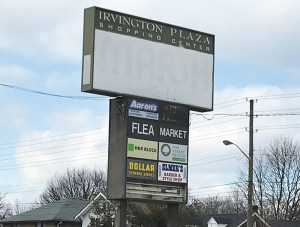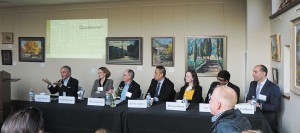A national panel of experts in urban redevelopment offered their assessments and recommendation regarding Irvington Plaza and the Ford/Visteon property on Friday, Feb. 15 at the Bona Thompson Memorial Center in Irvington. Department of Metropolitan Development officials and an overflow audience of Irvington business owners and residents were on hand to hear the preliminary report.
Stressing that the Urban Land Institute’s (ULI) volunteer panelists were there to begin a conversation about what was possible, Director of the Department of Metropolitan Development Emily Mack noted that the City sought recommendations to better understand the potential of Irvington Plaza and the former Ford/Visteon sites, and to consider options in long-range planning. State Representative Dan Forestal noted that he was looking forward to the assessment as well, as he was a firefighter (when not at the Statehouse) working out of the IFD Station on Sheridan Ave. next to the plaza. “I’ve seen firsthand the issues there and am familiar with the problems.”
The ULI laid out recommendations based on interviews with nearly 100 residents, business owners, community leaders, and city officials, plus their own experience with redevelopment in other parts of the United States. Panel chair Alan Razak said they were surprised that such a large tract of property in a strong historic neighborhood has not been redeveloped. “This tract screams ‘opportunity,’ and should have been reclaimed by now,” he noted.
The recommendations for the site included a “gathering-gateway” comprised of a park-like area fronting Washington St., and a performance outdoor theatre toward the back. The area could feature a splash park or ice rink, or other recreational component. The “piazza” concept would feature a “niche” grocery on one side with parking behind, and other retail on the other side. The retail would be brought up closer to the street. Facing the Pennsy Trail at the back of the property could be maker spaces for artists and craftspeople. The panel also noted that the plan could easily incorporate the existing Dairy Queen, which several interview subjects noted as a favorite destination in the existing plaza.
In addition to retail, the panel recommended a mix of housing, with larger townhomes, plus smaller apartments, suggesting about 226 for sale townhomes and 214 rental units. They suggested that Julian be extended through the property to create a better traffic pattern into the property and to tie it in with the surrounding neighborhood.
Referring to the future Blue Line bus line that will run on East Washington Street, the panel noted that redevelopment of Irvington Plaza would be easily accessible without a car. They recommended that the proposed Blue Line stop on Washington be named “Irvington Plaza” rather than Ridgeview Station, further increasing the profile of redevelopment. The experts also agreed that the historic commercial district of Irvington (roughly Washington from Ritter to Audubon) could be easily connected to the plaza with broadened sidewalks and other features to invite walking, biking, and scooter usage between the two sites.
As with any visioning and planning exercise, there was discussion of potential funding of such a large-scale project. The panel recommended a public/private partnership to buy the existing plaza and adjacent parcels for redevelopment using TIF bonds, then resell to developers who would coordinate with the city to implement the vision. They estimated the overall costs (including acquisition, building, demolition, maintenance, and other expenses) would be $90 million, but would bring in $106 million in revenue through property, sales, and additional income taxes. They stressed that city involvement is historically how such large-scale projects get completed. They also suggested that it would be a long-term commitment of resources, as acquiring, funding, zoning, and planning would be needed before anything could happen — possibly five years down the road.
Razak stated that the recommendations put forward offered a “generational opportunity” to strengthen the historic Irvington neighborhood by enhancing its existing assets. After the presentation, Mack said that the panel would draw up a final report and the city would need time to digest the recommendations.
Irvington Plaza was first opened in the 1950s and was a vital retail center for decades. However, as shopping patterns changed and stores moved away from urban areas in the 1970s, the plaza began to suffer from the loss of high-volume retailers. The last major retailer in the plaza was Marsh Supermarket, which closed in 2017. Currently, it is home to the Irvington Flea Market, and a few businesses.




